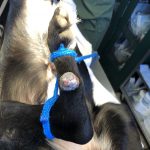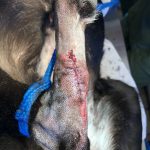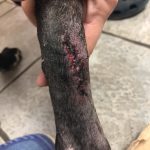Could it maybe be caused by a tick-bourne illness? Erlichia, etc? Were any labs run? Tick PCR, etc? Or even a foxtail, maybe?
Comments
Comments
-
Megan Tholin
We have an almost 8 month old hound mix. We were thinking about getting an invisible fence. I’m curious about any opinions you have of invisible fences and also if you think it’s a good idea for a hound. Thank you.
Comments
I adopted a 4 year old rescue small lab mix about 2 weeks ago. She is already deeply attached to me, and is starting to show some separation anxiety. Keeping her contained and safe while I’m at work has become a challenge. My Boston Terrier is content gated in the kitchen, but my rescue Duchess simply climbs over the gate. So I put her in a crate and I have attached a pic of the result (it’s sideways). She had bloodied her mouth and scraped her muzzle. The last couple of days I’ve left her loose in the house and hoped for the best. I saw evidence of her trying to push the gate through to get into the kitchen – to be with my other dog? I don’t know. Any advice is welcome.
Comments
-
Anonymous If you’re located near Dr. M, I’d look into obedience classes near you – 4Paws has a selection of classes to consider. She might be otherwise obedient, but classes will help to make her feel more secure in her position in your home, and will help her settle now that she’s past the 2 week introduction phase. More info about training classes at 4Paws here: http://www.4pawsspaonline.com/training.html Kathy Forthman’s a good trainer.
I have 2 Pit mixes that itch and chew their paws like crazy. Penny was on Apoquel and can no longer take it because she developed a non cancerous growth on her leg. Sampson was also on it but the only difference it made was his paws weren’t red but still chewed just as much. I was reading and found that his may have something to do with yeast since he has that musty, Frito Corn Chips smell. Penny does not smell. My current Vet put him on a prescription diet (Royal Canin moderate calorie potato and white fish). He has been on it awhile now with no other foods or treats. I also switched Penny more recently. It has not helped them at all. I read that carbohydrates feed yeast but I can not find any foods that don’t have some type of starch. I also clean their paws often with a mix of iodine, apple cider vinegar and water. Nothing helps and I feel horrible for how uncomfortable they must be. I am currently giving them Zyrtec also. I was thinking of having them tested at a veterinarian dermatologist but wanted that as a last resort. Does anyone have any thoughts on this? I just want to give my pups some relief!
Comments
I have an 8 week old Beagle/Labrador mix puppy (Sonny). He is currently on ID because he had diarrhea when I brought him home last weekend. He is “solid” and ready for regular puppy food to be introduced, and I’m at a loss on what to choose. So confused about grain-free debate and ensuring no by products. Please can you give some guidance? Favorites?
































What a darling!